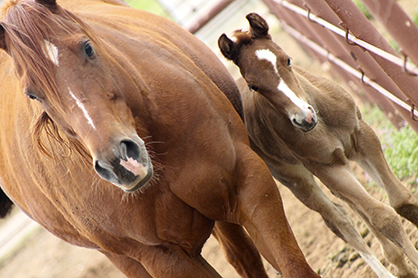Equine Pregnancy: What to Expect When Your Horse is Expecting
Breeding a mare can be a busy time, with frequent ultrasound examinations, uterine lavages, oxytocin injections, and inseminations. All of those hours become worth it when, 14-16 days after ovulation, the work has paid off and your mare is pregnant. But what happens next?
On Tuesday, April 5, at 6:30 p.m., Dr. Jennifer Linton will present “Equine Pregnancy: What to Expect When Your Horse is Expecting.” The presentation is part of the First Tuesday Lecture Series at Penn Vet’s New Bolton Center, 382 West Street Road, Kennett Square, PA.
The series offers free lectures to the public on equine topics on the first Tuesday of selected months. The lectures take place in New Bolton Center’s Alumni Hall. Due to limited seating, reservations are recommended and can be made by contacting Barbara Belt at beltb@vet.upenn.edu.
Linton, a specialist in reproduction, is a veterinarian on New Bolton Center’s Equine Field Service team. During the lecture, she will discuss regular timing for evaluation of the mare, routine management (including vaccination and deworming), and signs of giving birth or of impending abortion. Specific topics such as twins, fetal gender identification, and placentitis also will be covered.
Linton earned her veterinary degree from Penn Vet in 2012, and completed an equine internship at Rhinebeck Equine, LLP, in Rhinebeck, New York. She returned to New Bolton Center in 2013 or her Residency in the Section of Reproduction and Behavior.
Linton’s primary areas of research include pregnancy loss, performance issues in mares, and uterine tumors in small ruminants. During the breeding season, Linton provides on-call emergency coverage for both Field Service and the Section of Reproduction, and has a special expertise in difficult pregnancies, both in mares and goats.
First Tuesday Lecture Spring Series:
May 3: New Bolton Center Clinical Team: “All About EQUIMAGINE™, Robotics-Controlled Imaging”
June 7: Dr. Barbara Dallap Schaer: “Medical Director Q&A: What’s New at New Bolton?”
About the First Tuesday Lecture Series
The First Tuesday Lectures are presented September through December, and March through June. During the series, faculty and clinicians at New Bolton Center share current information on topics of interest and relevance to horse owners and caregivers throughout the region. Many of the lectures highlight the advanced techniques performed by Penn Vet’s team of leading clinicians and the state-of-the-art equipment and facilities available to ensure the best possible outcomes for patients.
About Penn Vet
The University of Pennsylvania School of Veterinary Medicine (Penn Vet) is a global leader in veterinary education, research, and clinical care. Founded in 1884, Penn Vet is the first veterinary school developed in association with a medical school. The school is a proud member of the One Health initiative, linking human, animal, and environmental health.
Penn Vet serves a diverse population of animals at its two campuses, which include extensive diagnostic and research laboratories. Ryan Hospital in Philadelphia provides care for dogs, cats, and other domestic/companion animals, handling more than 30,000 patient visits a year. New Bolton Center, Penn Vet’s large-animal hospital on nearly 700 acres in rural Kennett Square, PA, cares for horses and livestock/farm animals. The hospital handles more than 4,000 patient visits a year, while the Field Service treats nearly 37,000 patients at local farms. In addition, New Bolton Center’s campus includes a swine center, working dairy, and poultry unit that provide valuable research for the agriculture industry.
For more information, visit www.vet.upenn.edu.











